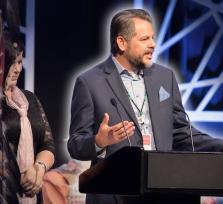Calvin Foster took the Second Fleet to “war” a few months ago. As deputy battle director, this U.S. Navy captain supported his admiral in the command of warships, submarines, aircraft, and unmanned systems. But the war game wasn’t staged in the Atlantic — it took place in cyberspace at MacDill Air Force Base in Tampa, Fla. “We simulated operating several hundred assets. Getting to see that big picture and applying it across the whole naval spectrum was pretty exciting,” says Foster, a member of the Muscogee Nation who graduated from the U.S. Naval Academy in 1992 with a degree in engineering.
Although his father served in the Air Force and his grandfather was an Army colonel, Foster chose to go to Annapolis after also receiving an appointment to West Point and an Air Force scholarship to Oklahoma State. “I was looking for adventure, innovation, and pathways to leadership in my life,” he says. (His advice to today’s students? “Apply to everything and see what happens.”)
He remembers being fascinated when he arrived at the academy by the Navy’s technologies — helicopters, jets, spacecraft, satellites, ships, submarines, landing craft, hovercraft, and the Tomahawk cruise missile. “All cool ways to employ our forces around the globe,” says Foster. He feels that the Navy’s culture embraces new technology. “The Navy’s senior leaders are expected to boldly step forward using that technology to defend our country and make our offensive capabilities the best they can be,” he says.
He’s proud that the Navy is an expeditionary force. “We go to where the fight is, and we’re the first to respond when there’s a humanitarian disaster,” says Foster. During his career he has been deployed to Kuwait, worked with the Japanese navy, and traveled throughout Europe.
His career focus has been on systems engineering, especially combat systems, such as radar, sonar, guns, and missiles. Each has its own computer programs (sometimes robotic) that communicate with each other and the sailors operating them. “When a missile is shot from a tube on a ship, it’s got its own special computer system inside that tells it where it is and talks to the ship,” says Foster. “More important, systems engineering makes sure our sailors know how to use a system and that it’s reliable.”
The Navy, according to Foster, is a world leader in digital engineering. This revolutionary new approach lets engineers create a virtual version of something physical, such as a missile. To speed innovation and problem solving, the “digital twin” lets engineers replicate with a computer program how the physical object works.
Foster grew up in Bristow, Okla., where his heritage was woven into every aspect of life. “I look back fondly on that sense of pride in our homeland and traditions, one-ness with nature, and honoring our forefathers,” he says. He finds those “reverberations of generations and generations” increasingly meaningful in a world that he says has a “snap-culture on instant seconds of things.”
As a military officer, he does more than serve his country. “I get to defend the tribal roots of the Muscogee Nation through my national service in the U.S. Navy,” says Foster. Thanks partly to his efforts, one of the Navy’s next Navajo-class rescue-and-salvage ships will be named the USNS Muscogee Creek Nation and join the USNS Lenni Lenape, USNS Saginaw Ojibwe Anishinabek, USNS Cherokee Nation, and USNS Navajo. “The Navy recognizes the importance of our American Indian heritage by naming ships after tribes. When they pull into ports, everyone sees that they are helping us defend the nation,” says Foster.
His sense of duty runs deeper than his father’s and grandfather’s service. His parents named him after an uncle who was killed in action in Vietnam in 1967 when his F-105 Thunderchief fighter was shot down. “We can look at so many Native Americans who gave their lives and who served with honor. Knowing that I was named after my uncle who died in battle was big inspiration for me as a kid,” says Foster. “I wanted to carry on that tradition.”














